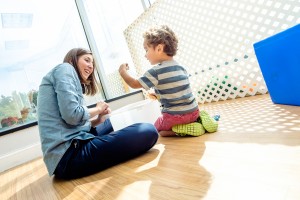Although our occupational and speech therapists have trained in numerous approaches to be able to create an individualized plan for each child, DIR/Floortime is at the heart of what we do. Developed by the late, highly regarded child psychiatrist Stanley Greenspan, DIR/Floortime is an approach that allows us to meet kids wherever they are on the developmental ladder, and use play to motivate them to participate and thrive in therapy.
DIR stands for Developmental, Individual-differences, and Relationship-based.
Developmental
In order to help a child move up the developmental ladder, we need to assess where they are on that ladder and start there. This involves a thorough assessment of carefully outlined markers for various developmental stages.
Individual-differences
Just as all of the kids we work with start from different developmental levels, they also have different ways of relating and responding to the world around them. This includes sensory processing (taking in and regulating responses to sensations such as sound and touch), movement, hearing and language. In order to help kids truly maximize their potential, we also consider each child’s personality, learning style, family dynamics, and school and home environments.
Relationship-based
This is perhaps the most important aspect of DIR/Floortime for us. We pride ourselves on emphasizing social and emotional development, and we understand that our greatest tool is our relationship with each child. In the context of a warm, caring and engaging relationship, we can motivate kids to participate (and have fun!) in therapy, and also model social and emotional skills. We also support parents and other caregivers in building strong relationships with their children based on developmentally appropriate interactions.
Floortime
The best way to interact with and teach your child is through play! In DIR/Floortime therapy sessions, we play. We follow the child’s lead and use his or her interests to engage, challenge and teach. We find that this is the most effective way to work with kids, because they are motivated by their own interests, feeling safe, and enjoying themselves.
Beyond the Therapy Room
We use DIR/Floortime principles in our Social Groups to help kids learn to make friends and play together. We also encourage parents to use DIR/Floortime strategies to engage in playful back-and-forth interactions with their children in their daily lives in order to nurture their kids’ social-emotional development. Entering a child’s world and joining with them to explore that world in the context of a loving, encouraging relationship is a powerful way to help kids with developmental challenges maximize their potential.


Recent Comments